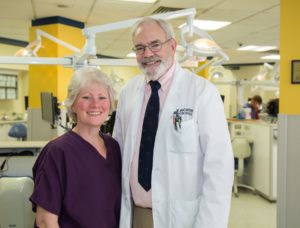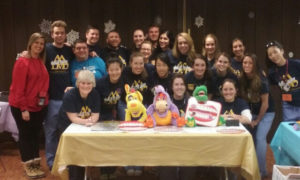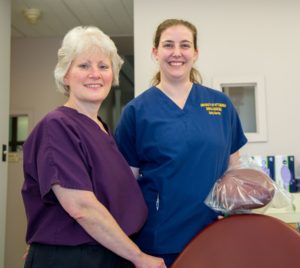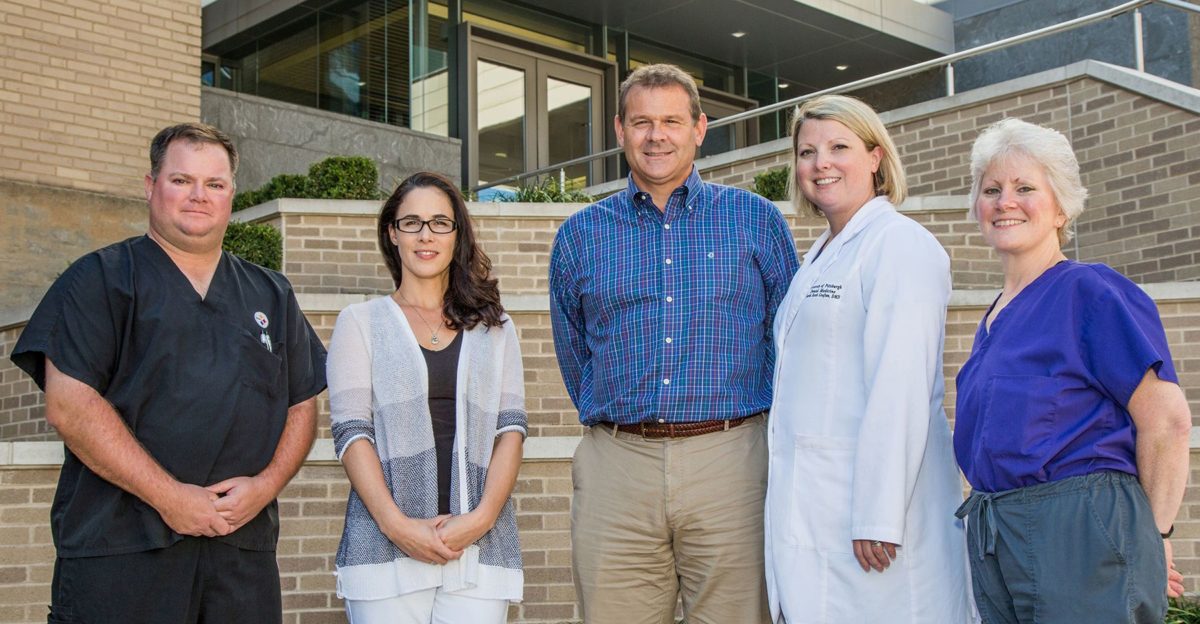Filling a Gap in Dental Care
Allegheny Graduate Lynne Taiclet Provides Vital Services, Education to Help Patients with Special Needs

How often have you heard someone say: “I hate going to the dentist”?
For most people, visiting the dentist doesn’t rank among their favorite things to do. But the majority of us can manage the anxiety and discomfort of the experience, even when it involves more than basic care.
However, individuals with special needs face significant obstacles when in need of dental treatment — particularly a lack of trained providers for adult patients who can no longer receive care in a pediatric dental clinic or children’s hospital. And Allegheny College graduate Lynne Taiclet, D.M.D., is at the forefront of addressing that gap, both in providing direct care and educating professionals.
Taiclet directs the Center for Patients with Special Needs (CPSN) at the University of Pittsburgh School of Dental Medicine. CPSN has been a pioneer among dental schools in the United States by providing new curriculum and advanced hands-on clinical experiences.
Over the course of 50 years, Pitt’s School of Dental Medicine has gradually increased the availability of appointments and variety of services provided to patients with disabilities. In 2008, the school renovated an area to enable the treatment of individuals with special needs, and the CPSN celebrated its grand opening.
Since that time, the center has become the dental home for nearly 3,000 individuals with special health care needs. Patients travel from a variety of locations to receive care, some from as far as five hours away.
Dental services are provided by students in the third- and fourth-year clinic curriculum, dental hygiene students and residents from various disciplines at the school. The students all have several required rotations in the CPSN, and by the time of graduation, must achieve a level of competency to pass the clinical course. All student treatment is supervised by faculty trained in special-care dentistry, including Taiclet, Allegheny class of 1981.
A Serendipitous Opportunity

Taiclet was somewhat drawn by Allegheny’s close proximity to her home in Pittsburgh, but more so by Allegheny’s strong reputation for preparing students for admittance to medical school. Forgoing the campus tour and applying sight-unseen, and only to Allegheny, she was thrilled to receive an early decision acceptance.
Taiclet, like many other first-year students, entered Allegheny thinking medical school would be her next step. However, dental school seemed more appropriate, given that she had worked as dental assistant since age 15. She applied and was accepted to the University of Pittsburgh’s School of Dental Medicine.
After graduating from dental school and completing a one-year dental residency program, Taiclet spent 23 years working as a dentist in her brother’s practice in the Sewickley area, just outside of Pittsburgh. In 2009, she agreed to work part-time in the CPSN.
Initially, Taiclet did not intend to leave private practice — then serendipity struck. Soon after she joined the CPSN, the clinic’s director had to leave Pittsburgh for family-related reasons. Taiclet was offered the position of interim director at the center. She assumed the post and within the year was promoted to director.
Taiclet’s responsibilities include teaching as well as administrative duties. She also functions as the faculty advisor for the student chapter of the American Academy of Developmental Medicine and Dentistry. The student chapter is actively involved in local and regional Special Olympics activities. Activities include volunteer time with setting up and scoring athletic events, dental screenings and fabrication of athletic mouth guards for athletes.
Teaching the Next Generation

The CPSN, typically open four days per week, has gained a reputation across Pennsylvania as a facility that enables dental care for individuals with special health care needs. The CPSN is one of only a few centers nationwide, and the only in Pennsylvania, directly involved with a three-year dental anesthesiology residency program.
Taiclet and her colleague faculty members supervise the students and residents while working in the center. The required rotations in the CPSN help provide students with clinical experiences and skills in the application of modifications to care that enable safe, efficient and effective dental treatment of adult patients with special health care needs. Through intentional training, the Center aims to remedy the nationwide deficit of dental services for individuals with special health care needs.
The CPSN treats patients with various types of disabilities, including those diagnosed with developmental disorders such as autistic spectrum disorder, intellectual disability, Down syndrome, cerebral palsy and spina bifida. The center also accepts patients with acquired disabilities, such as stroke, traumatic brain/spinal cord injuries, Alzheimer disease, Parkinson disease, multiple sclerosis and ALS.
Some patients need only the accommodation of being treated in their specialized wheelchair or scooter. Fortunately, the CPSN has three treatment rooms where the dental chair is on wheels and can be moved so the patient can be treated in their own wheelchair.
Many of these patients, for various reasons, are resistant to dental treatment. Therefore, the Center’s team members have to be creative in developing protocols that respond to each patient’s needs. An easy solution may be handing a client a pair of sunglasses, if the light is too bright, or providing treatment in a “quiet room” with only two practitioners if sound is an issue.
Earning patience is part of the dental students’ training: some clients can tolerate only having three to four teeth cleaned at a time before they need a break. So the clinicians might have to sing to or “count down” for their patients to provide a diversion. The patient-care workaround list is long and inventive.
“In order to overcome their anxiety, the patients might wear headphones, shutting us out by listening to music, or may need to be treated sitting upright instead of laying back in the chair,” says Taiclet. For some patients, behavior modification and other techniques are not enough; in these situations, various types of sedation techniques are available.
An Allegheny Connection

The connection between Allegheny College and the University of Pittsburgh School of Dental Medicine has continued through the years. Taiclet says that several of her classmates at Allegheny also were her classmates at the school. In addition, each class before and after her while included Allegheny alumni.
Now, as a faculty member, Taiclet has had the opportunity to teach numerous Alleghenians as dental students, with Gators in nearly every class she has been involved with since 2009. In addition, several current school staff and faculty are Allegheny alumni (see photos) or have been previous faculty members (see list).
Taiclet’s son, Ethan Winter ’14, also graduated from Allegheny, majoring in managerial economics with a minor in writing. He married his high school sweetheart, Laura Moss, in October 2016. They both work at PNC in Pittsburgh and are living in the North Hills area.
While a studying at Allegheny, Taiclet developed skills she uses to this day — notably, how to feel comfortable in a leadership position, how to communicate with a wide range of people, and how to write in a concise fashion.
“In my current role, and in private practice as well, I have often had to write letters, communicating with insurance companies or other healthcare providers for example,” Taiclet says. “Also, as a faculty member at a university, publications are expected. The writing skills that were instilled while I attended Allegheny remain with me. And thanks to Allegheny, I love to read. I will always appreciate the foundational skills provided to me through a liberal arts education at Allegheny College.
“Allegheny is still my school. I had a great experience there and I value my undergraduate education immensely.”